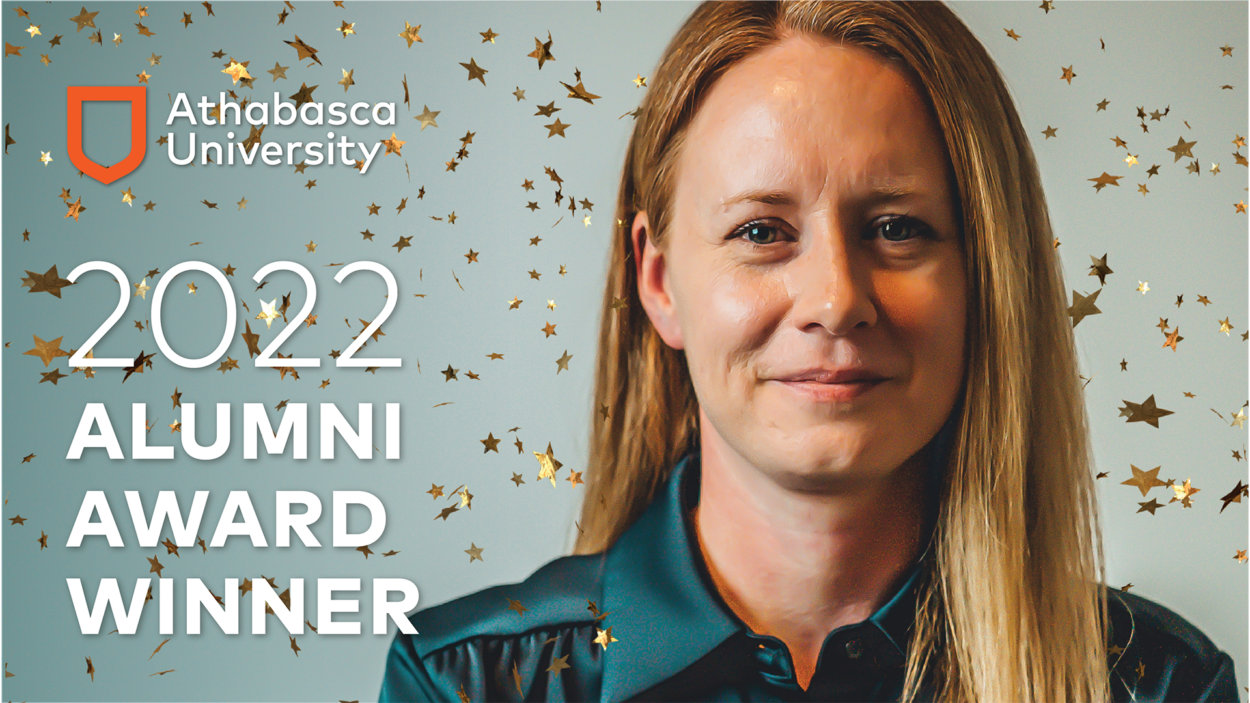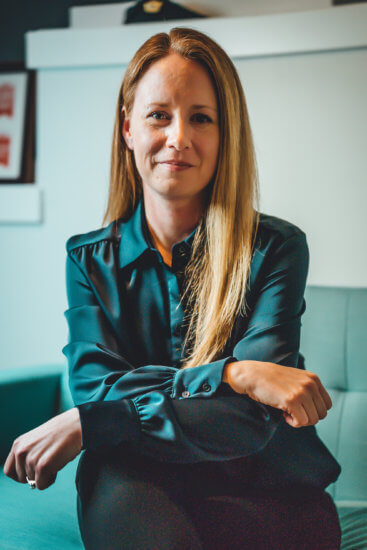AU’s Rising Star aims to digitally transform the construction industry

She started her career on construction sites working with pens and paper. Athabasca University’s Rising Star Alumni Award winner now leads a team that’s deploying some of the industry’s most advanced technology
Tannis Liviniuk (Master of Business Administration ‘15) was once sent home on the first day of a construction job because her foreman didn’t think a woman could handle the physically demanding work. She was “devastated” and considered pursuing a career in a different industry, but the next day she decided she wouldn’t let anyone dictate her career path. Twenty years later, she has left quite a trail.
Today, she leads an industry consulting company with nearly 2 dozen employees across Canada. Spurred in part by the early experience, Athabasca University’s 2022 Rising Star Alumni Award winner makes a significant effort, both personally and professionally, to support women in the industry.

“I purposefully engage in those conversations, because I never want anybody to have that same experience,” she said. “Somebody who doesn’t have the same level of stubbornness as I do might say, ‘This isn’t for me.’” She has also made it a priority to participate in, support, and share her story at conference discussions, podcasts, and events where women in industry is a topic of focus.
But that’s not the most remarkable thing about this story. What’s more remarkable is how successful the company Liviniuk founded has been.
It began in 2018 with a staff of just one: Liviniuk herself. She focused on helping other companies in the industry to design, build, and operate their large-scale projects and facilities more efficiently using technology and other innovative practices to create better value for their organizations.
In a few short years, Trillium Advisory Group has grown to 21 employees, still focused on supporting other organizations in the construction space. In 2020, it was ranked the 28th fastest growing startup in Canada by Canadian Business magazine.
It was so successful that in 2021 it was purchased by a Texas-based company, Zachry Group. Liviniuk continues to lead the company as president and said she has plans to continue growing it to positively impacting the industry through innovation and digitization initiatives.
I decided I’d work in Fort McMurray for a year to save up some money for law school, but after spending a year working on a construction project I never went back. I was hooked at that point and wouldn’t change my industry choice for the world. Tannis Liviniuk, AU's 2022 Rising Star Alumni Award winner
Construction industry a ‘family business’ for AU’s Rising Star
Although Liviniuk grew up around the construction industry—her father owned a small crane-rental operation—getting into the “family business” wasn’t something she initially wanted to pursue.
In school, she was always a structured child who did well academically, she said, but didn’t enjoy high school because she wasn’t always able to study topics she found most interesting. It wasn’t until university, when you can focus your learning on topics that inspire you, that she began to really thrive in her education.
She studied psychology for her undergraduate degree, originally with the intention of using that background to support her future plans for a law degree and a career as an attorney. Although she has taken her career in a different direction, she said she nonetheless applies a lot of what she learned in that degree to her current role.

Shifting career path
Like many people, Liviniuk chose to take time off school to work and save money before pursuing law school.
“I decided I’d work in Fort McMurray for a year to save up some money for law school, but after spending a year working on a construction project I never went back,” she said. “I was hooked at that point and wouldn’t change my industry choice for the world.”
This was around 2007, in the early days of construction automation technology—a lot of the software used to automate paper-based processes was in its infancy and presented exciting opportunities to digitize cumbersome paper-based workflows. Liviniuk could immediately see the benefit of moving away from a dependence on paper. She developed a reputation as someone who “knew computers”; she spent weeks leaning new programs and figuring out how they could replace the many binders full of papers that track different components of a large job.
“I developed a bit of a fascination for the potential of what could be in the construction industry,” she said. “I’ve been in that space ever since.”
Athabasca University MBA supports entrepreneurial success
It was not long before Liviniuk started her second business. She said she has always had an entrepreneurial spirit, including an unsuccessful first attempt at starting a business in high school.
This time she was more successful, running a construction-industry training company for several years. Although she did fairly well, in many ways she felt out of her element.
“I recognized, as I was navigating topics like contracts and finance, that I was really lacking the foundation that I would need to be successful in launching a company that could scale,” she said.
When Liviniuk started looking at options, she said the decision to take AU’s Master of Business Administration program “wasn’t hard, frankly.”
She had heard of the program’s reputation from friends who had attended and had positive experiences. She also appreciated that she could fit her school schedule around her job and continue working full time.
But most significantly, she said she liked that AU’s MBA has a practical focus and comes with a built-in opportunity to learn from peers, most of whom are also studying while working full-time in other industries and would readily share knowledge and advice with each other.
“Outside of the course content and the credential, that peer-to-peer learning is invaluable. You can’t put a price tag on that level of insight and mentorship,” she said.

Rising Star sees a bright future
Liviniuk credits that insight and mentorship, in no small part, with the success of her company Trillium, which has grown so quickly and demonstrated so much value.
She said she sees herself as a lifelong learner with all kinds of potential for her to further develop her education, whether that’s through a formal doctoral program or just taking courses here and there as something strikes her fancy.
But despite seeing so much potential for further education and having sold the company, Liviniuk has no intention of stepping away from Trillium or moving in a different direction any time soon. There is simply still too much she wants to accomplish with the Trillium team.
“We have these deep and meaningful conversations around what the industry is going to look like 10 years from now,” she said. “So where do I see myself 10 years from now? I see myself continuing to innovate with the remarkable colleagues at Trillium, building on that passion. From machine learning to 4D planning and digital twins, we’re doing really exciting work that is shifting the project landscape, improving access to data, and making worksites safer.”
Liviniuk also plans to continue supporting committees and think tanks within the industry as well, giving back through volunteering time in the development of industry resources, educational programs, and best practice-guides.
She added that while she never plans to leave the construction industry, she is planning to revisit some familiar ground within that industry, spending some more time working in Alberta’s northern boreal forest before her career wraps up.
“At the point I retire, I’m probably going to go back up to Fort McMurray and work one last short project before I hang up my hard hat, tie my boots up, and call it call it a career.”
“I began my career working on site in a pair of steel-toed boots. That’s where I’m going to end my career as well. And I’m hoping that instead of a stack of paper in my hand, I’ll be taking in those last views through an augmented-reality visor.”